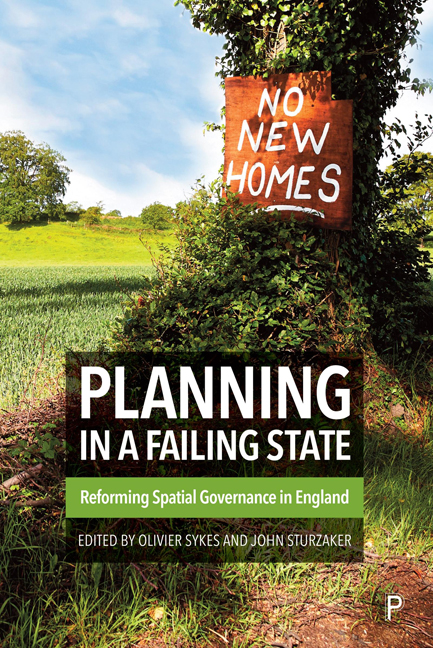Book contents
- Frontmatter
- Dedication
- Contents
- List of figures and tables
- Notes on contributors
- Acknowledgements
- 1 Introduction
- 2 The (housing) numbers game
- 3 Localism: the peccadillos of a panacea
- 4 Planning at the ‘larger than local’ scale: where next?
- 5 PD games: death comes to planning
- 6 Building beauty? Place and housing quality in the planning agenda
- 7 Zoning in or zoning out? Lessons from Europe
- 8 Planning and the environment in England, 2010–22: cutting ‘green crap’, Brexit and environmental crises
- 9 Stuck on infrastructure? Planning for the transformative effects of transport infrastructure
- 10 Conclusion
- Index
9 - Stuck on infrastructure? Planning for the transformative effects of transport infrastructure
Published online by Cambridge University Press: 27 March 2024
- Frontmatter
- Dedication
- Contents
- List of figures and tables
- Notes on contributors
- Acknowledgements
- 1 Introduction
- 2 The (housing) numbers game
- 3 Localism: the peccadillos of a panacea
- 4 Planning at the ‘larger than local’ scale: where next?
- 5 PD games: death comes to planning
- 6 Building beauty? Place and housing quality in the planning agenda
- 7 Zoning in or zoning out? Lessons from Europe
- 8 Planning and the environment in England, 2010–22: cutting ‘green crap’, Brexit and environmental crises
- 9 Stuck on infrastructure? Planning for the transformative effects of transport infrastructure
- 10 Conclusion
- Index
Summary
Introduction
Transport infrastructure is essential for sustaining and facilitating everyday activities. As an agent of change, transport shapes territorial development, as illustrated by two economists writing half a century apart. Colin Clark’s (1958) path-breaking piece, ‘Transport: maker and breaker of cities’, reviews the role of transport over two centuries up to the mid-1950s and embraces the arrival of the 20th-century road/car era, when cars began to revolutionise travel and personal freedom. Similarly, Edward Glaeser’s (2020) recent review, ‘Infrastructure and urban form’, captures technological advances and geographical changes in transport over three major stages: the emergence of new transport technology; the expansion of transport networks around the new technology; and the restructuring of existing networks.
However, mega-transport investments have long been a subject of fierce debate and controversy. In his classic work Great Planning Disasters, Hall (1980) applied Friend and Jessop’s (1969) uncertainty models to analyse the planning processes of mega-transport project sagas, including London’s third airport, London’s motorways and San Francisco’s Bay Area Rapid Transit (BART) systems. He challenged the mainstream rational model approach for its failure to consider imperfect information, the conflicting values and interests of actors, and unquantifiable or unremunerative objectives.
Proposals for mega-infrastructure projects are inevitably controversial due to competing interests and demands, increasingly expansive networks, complex human settlements, high costs, and potential environmental disturbance. Since the 2008 financial crisis, an economic narrative has suggested that transport investment creates, sustains or unblocks jobs (Masden and McDonald, 2019). Providing persistent inequalities, England has been criticised for its lack of transport infrastructure investment, making it one of the most polarised countries among advanced economies. The policy objective for investing in mega-transport infrastructure, such as High Speed Two (HS2), has widened its conventional impacts beyond increasing network capacity, unblocking congestion and travel time savings to embrace further transformative effects, including addressing regional inequalities.
Over the past decade, the phrase ‘Rebalancing Britain’, which first appeared in a consultation document (DFT, 2011), has been used as the primary justification for HS2. Since the election of the Conservative–Liberal Democrat Coalition government in 2010, followed by subsequent Conservative administrations after 2015, various reforms, funding programmes and policy documents on rail infrastructure have been produced, aiming to address inequality at different institutional levels.
- Type
- Chapter
- Information
- Planning in a Failing StateReforming Spatial Governance in England, pp. 138 - 159Publisher: Bristol University PressPrint publication year: 2023



